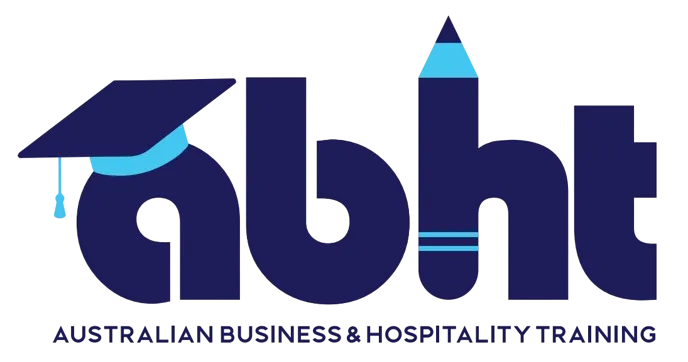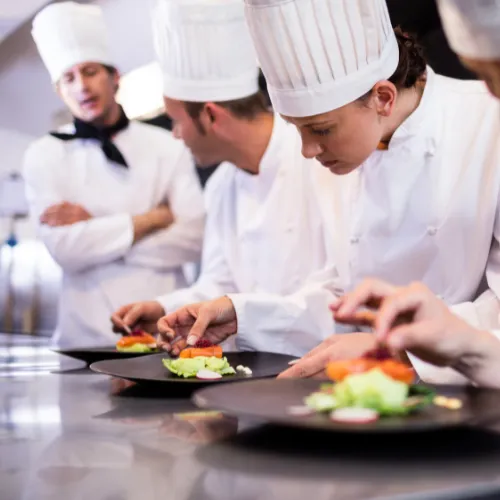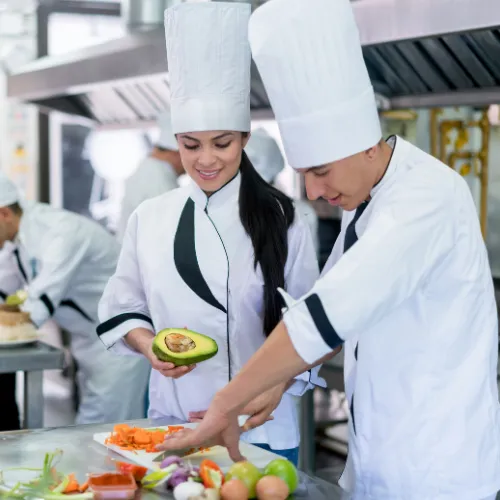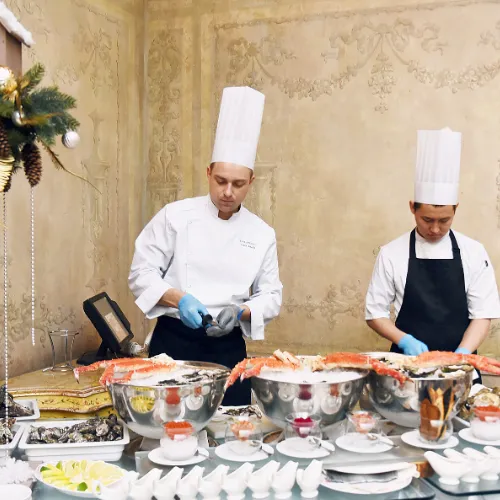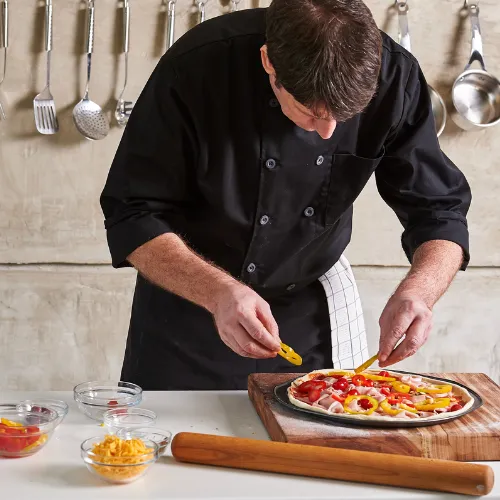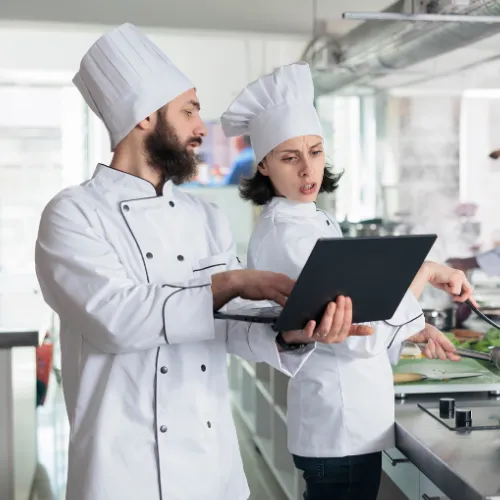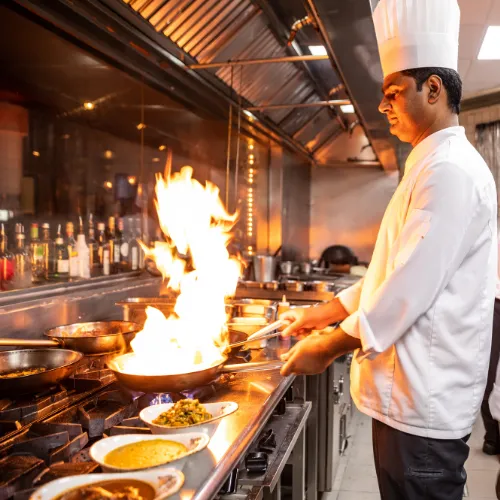SIT30821 - Certificate III Commercial Cookery
Course Description
Ready to take your kitchen skills to the next level? Our Certificate III in Commercial Cookery is your gateway to becoming a culinary pro, whether you're dreaming of running a kitchen or creating mouth-watering dishes that wow guests. From perfecting your knife skills to mastering sauces, sautés, and sizzling mains, you’ll learn it all!
This course gives you hands-on experience in a real kitchen, teaching you everything from menu planning to food safety (because no one likes a soggy soufflé or a health hazard!). You'll walk away with the know-how to handle the heat of a commercial kitchen and the skills to plate up like a chef. If you’re passionate about food and ready to turn your love for cooking into a career, this is where your culinary adventure starts!
What will you study?
In a Certificate III in Commercial Cookery, you'll complete 25 units covering a wide range of culinary skills, including food preparation, cooking techniques, and kitchen operations, preparing you for a dynamic career as a professional cook.

Course Enrolment:
Anytime

Entry Requirements:
Nil

Course Duration:
Up to 3 years

Location:
ABHT are approved to deliver this course nationally via our online platform and can deliver this training face to face in the workplace throughout Metro & SE QLD.

Study Options:
Training can be delivered face to face in the workplace or in a traditional classroom environment. Students can also study within their own schedule using our online platform or combination of face-to-face and online training.

Study Pathways:
Certificate IV Kitchen Management
Diploma of Hospitality Management
Certificate III Commercial Cookery Training Plan
Commercial Cookery Units
SITHCCC023* Use food preparation equipment
This unit describes the performance outcomes, skills and knowledge required to safely use commercial kitchen equipment to prepare a range of different food types. The unit applies to operational personnel responsible for general food preparation tasks in hospitality and catering organisations. It applies to individuals who work with very little independence and under close supervision. They follow predefined organisational procedures and report any discrepancies to a higher-level staff member for action.
SITHCCC027* Prepare dishes using basic methods of cookery
This unit describes the performance outcomes, skills and knowledge required to use a range of basic cookery methods to prepare dishes. The unit applies to cooks working in hospitality and catering organisations. This could include restaurants, educational institutions, health establishments, defence forces, cafeterias, kiosks, cafes, residential caterers, in-flight and other transport caterers, and event and function caterers. It applies to individuals who work with very little independence and under close supervision and guidance of more senior chefs. They follow predefined organisational procedures and report any discrepancies to a higher-level staff member for action.
SITHCCC028*Prepare appetisers and salads
This unit describes the performance outcomes, skills and knowledge required to prepare appetisers and salads following standard recipes. It requires the ability to select and prepare ingredients, and to use relevant equipment and cookery and food storage methods. The unit applies to cooks working in hospitality and catering organisations. This could include restaurants, educational institutions, health establishments, defence forces, cafeterias, kiosks, cafes, residential caterers, in flight and other transport caterers, and event and function caterers. It applies to individuals who work with very little independence and under close supervision and guidance of more senior chefs. They follow predefined organisational procedures and report discrepancies to a higher-level staff member for action.
SITHCCC029* Prepare stocks, sauces and soups
This unit describes the performance outcomes, skills and knowledge required to prepare various stocks, sauces and soups following standard recipes. It requires the ability to select and prepare ingredients, and to use relevant equipment and cookery and food storage methods.The unit applies to cooks working in hospitality and catering organisations. This could include restaurants, educational institutions, health establishments, defence forces, cafeterias, kiosks, cafes, residential caterers, in flight and other transport caterers, and event and function caterers. It applies to individuals who work with very little independence and under close supervision and guidance of more senior chefs. They follow predefined organisational procedures and report any discrepancies to a higher level staff member for action.
SITHCCC030* Prepare vegetable, fruit, eggs and farinaceous dishes
This unit describes the performance outcomes, skills and knowledge required to prepare and cook various vegetable, fruit, egg and farinaceous dishes following standard recipes. It requires the ability to select and prepare ingredients, and to use relevant equipment, cookery and food storage methods .The unit applies to cooks working in hospitality and catering organisations. This could include restaurants, educational institutions, health establishments, defence forces, cafeterias, kiosks, cafes, residential caterers, in flight and other transport caterers, and event and function caterers. It applies to individuals who work with very little independence and under close supervision and guidance of more senior chefs. They follow predefined organisational procedures and report any discrepancies to a higher level staff member for action.
SITHCCC031* Prepare vegetarian and vegan dishes
This unit describes the performance outcomes, skills and knowledge required to prepare and cook various vegetarian and vegan dishes following standard recipes. It requires the ability to select and prepare ingredients, and to use relevant equipment, cookery and food storage methods. The unit applies to cooks working in hospitality and catering organisations. This could include restaurants, educational institutions, health establishments, defence forces, cafeterias, kiosks, cafes, residential caterers, in flight and other transport caterers, and event and function caterers. It applies to individuals who work under the guidance of more senior chefs. They demonstrate autonomy and judgement to complete routine activities and take limited responsibility in known and stable contexts within established parameters.
SITHCCC035* Prepare poultry dishes
This unit describes the performance outcomes, skills and knowledge required to prepare and cook a range of poultry dishes following standard recipes. It requires the ability to select, prepare and portion poultry, and to use relevant equipment, cookery and food storage methods. The unit applies to cooks working in hospitality and catering organisations. This could include restaurants, educational institutions, health establishments, defence forces, cafeterias, kiosks, cafes, residential caterers, in flight and other transport caterers, and event and function caterers. It applies to individuals who work under the guidance of more senior chefs. They demonstrate autonomy and judgement to complete routine activities and take limited responsibility in known and stable contexts within established parameters.
SITHCCC036* Prepare meat dishes
This unit describes the performance outcomes, skills and knowledge required to prepare and cook a range of meat dishes following standard recipes. It requires the ability to select, prepare and portion meat, and to use relevant equipment, and cookery and food storage methods. The unit applies to cooks working in hospitality and catering organisations. This could include restaurants, educational institutions, health establishments, defence forces, cafeterias, kiosks, cafes, residential caterers, in flight and other transport caterers, and event and function caterers. It applies to individuals who work under the guidance of more senior chefs. They demonstrate autonomy and judgement to complete routine activities and take limited responsibility in known and stable contexts within established parameters.
SITHCCC037* Prepare seafood dishes
This unit describes the performance outcomes, skills and knowledge required to prepare and cook a range of fish and shellfish dishes following standard recipes. It requires the ability to select, prepare and portion seafood, and to use relevant equipment, and cookery and food storage methods. The unit applies to cooks working in hospitality and catering organisations. This could include restaurants, educational institutions, health establishments, defence forces, cafeterias, kiosks, cafes, residential caterers, in flight and other transport caterers, and event and function caterers. It applies to individuals who work under the guidance of more senior chefs. They demonstrate autonomy and judgement to complete routine activities and take limited responsibility in known and stable contexts within established parameters.
SITHCCC041* Produce cakes, pastries and breads
This unit describes the performance outcomes, skills and knowledge required to produce cakes, pastries and breads in a commercial kitchen following standard recipes. It requires the ability to select, prepare and portion ingredients; and to use relevant equipment a range of cookery methods to make and decorate cakes, pastries and breads, and food storage methods. It does not cover the specialist skills used by patissiers to produce specialist patisserie products. These are covered in the range of patisserie units coded ‘PAT’.The unit applies to hospitality and catering organisations that produce and serve cakes, pastries and breads, including hotels, restaurants and patisseries. It applies to individuals who work under the guidance of more senior chefs. They demonstrate autonomy and judgement to complete routine activities and take limited responsibility in known and stable contexts within established parameters.
SITHCCC042* Prepare food to meet special dietary requirements
This unit describes the performance outcomes, skills and knowledge required to prepare dishes for people who have special dietary needs for lifestyle, medical or religious reasons. It requires the ability to confirm the dietary requirements of customers, use special recipes, select special ingredients and produce food to satisfy special requirements. This unit does not include recipe planning for special diets which is covered in the unit SITHKOP012 Develop recipes for special dietary requirements. The unit applies to cooks and patissiers working in hospitality and catering organisations. This could include restaurants, educational institutions, health establishments, defence forces, cafeterias, kiosks, cafes, residential caterers, in flight and other transport caterers, and event and function caterers. It applies to individuals who work under the guidance of more senior chefs. They demonstrate autonomy and judgement to complete routine activities and take limited responsibility in known and stable contexts within established parameters.
SITHCCC043* Work effectively as a cook
This unit describes the performance outcomes, skills and knowledge required to work as a cook. It incorporates all aspects of organising, preparing and cooking a variety of food items across different service periods and menu types; using a range of cooking methods and team coordination skills. The unit integrates key technical and organisational skills required by a qualified commercial cook. It brings together the skills and knowledge covered in individual units and focuses on the way they must be applied in a commercial kitchen.The unit applies to cooks working in hospitality and catering organisations. This could include restaurants, educational institutions, health establishments, defence forces, cafeterias, kiosks, cafes, residential caterers, in flight and other transport caterers, and event and function caterers. Menu types may be classical, contemporary or ethnic and service may be formal or informal. It applies to individuals who work under the guidance of more senior chefs. They demonstrate autonomy and judgement to complete routine activities and take limited responsibility in known and stable contexts within established parameters.
SITHKOP010 Plan and cost recipes
This unit describes the performance outcomes, skills and knowledge required to plan and cost recipes for dishes or food product ranges for any type of cuisine or food service style. It requires the ability to identify customer preferences, select recipes to meet customer and business needs, cost recipes and evaluate their success. It does not cover the specialist skills used by senior catering managers and chefs to design and cost complex menus after researching market preferences and trends. Those skills are covered in SITHKOP015 Design and cost menus. The unit applies to hospitality and catering organisations. Recipes can be for ongoing food service, for an event or function, or for a food product range such as patisserie products. It applies to cooks, patissiers and catering personnel who usually work under the guidance of more senior chefs.
SITHPAT016* Produce desserts
This unit describes the performance outcomes, skills and knowledge required to produce hot, cold and frozen desserts following standard and special dietary recipes. It requires the ability to select, prepare and portion ingredients and to use equipment and a range of cookery methods to make and present desserts. The unit applies to hospitality and catering organisations that produce and serve desserts, including hotels, restaurants, clubs and patisseries. It applies to patissiers who usually work under the guidance of more senior pastry chefs.
SITHCCC026*Package prepared foodstuffs
This unit describes the performance outcomes, skills and knowledge required to package and label prepared foodstuffs for storage and transportation. It requires the ability to check the quality of food and select correct packaging materials. The unit applies to operational personnel in hospitality and catering organisations that prepare, package and label food. This could include restaurants, educational institutions, health establishments, defence forces, cafeterias, kiosks, cafes, residential caterers, in-flight and other transport caterers, and event and function caterers. It applies to individuals who work with very little independence and under close supervision. They follow predefined organisational procedures and report any discrepancies to a higher-level staff member for action.
SITHCCC040 Prepare and serve cheese
This unit describes the performance outcomes, skills and knowledge required to prepare and serve cheese and cheese dishes. This requires a comprehensive knowledge of cheese varieties.
The unit applies to hospitality and catering organisations where cheese is served as a menu course. Responsibility for cheese may rest with a range of individuals depending on the organisation. It may include cooks or senior food and beverage attendants.
Cheeses may include milk-based products from cows, sheep, goats or buffalo, or alternatives such as soy. They may be traditional, contemporary or specialist and may be locally produced or imported.
SITHCCC044 Prepare specialised food items
This unit describes the performance outcomes, skills and knowledge required to prepare and cook food items that are more unusual in nature than those in standard recipes. It requires the ability to select and prepare ingredients, use relevant equipment, specialised cookery and food storage methods.
The unit applies to cooks working in hospitality and catering organisations. This could include restaurants, educational institutions, health establishments, defence forces, cafeterias, kiosks, cafes, residential caterers, in flight and other transport caterers, and event and function caterers.
Because the nature of food items prepared is specialised, it may apply to chefs and cooks with advanced skills or with skills in very particular styles of cooking.
Kitchen Operations
SITXINV006* Receive, store and maintain stock
This unit describes the performance outcomes, skills and knowledge required to check and take delivery of stock and appropriately store, rotate and maintain the quality of stock items. It requires the ability to store perishable supplies in optimum conditions to minimise wastage and avoid food contamination. The unit is particularly important within a food safety regime and applies to hospitality and catering organisations, including hotels, restaurants, clubs, educational institutions, health establishments, defence forces, cafeterias, residential caterers, in flight and other transport caterers, event and function caterers. Personnel at many levels use this skill in the workplace during the course of their daily activities, including cooks, chefs, caterers, and kitchen attendants.
SITHKOP009* Clean kitchen premises and equipment
This unit describes the performance outcomes, skills and knowledge required to clean food preparation areas, storage areas, and equipment in commercial kitchens to ensure the safety of food. It requires the ability to work safely and to use resources efficiently to reduce negative environmental impacts. This unit is particularly important within a food safety regime and applies to all hospitality and catering organisations with kitchen premises, including permanent or temporary kitchens or smaller food preparation areas. These can be found within restaurants, cafes, kiosks, cafeterias, clubs, hotels, attractions and in catering facilities. The unit applies to kitchen personnel who work with very little independence and under close supervision, including kitchen attendants and stewards. It can also apply to cooks and chefs in small organisations.
SITXHRM007 Coach others in job skills
This unit describes the performance outcomes, skills and knowledge required to provide on-the-job coaching to colleagues. It requires the ability to explain and demonstrate specific skills, knowledge and procedures and monitor the progress of colleagues until they are able to operate independently of the coach. The unit applies to experienced operational personnel and to supervisors and managers who informally train other people in new workplace skills and procedures. It applies to all tourism, travel, hospitality and event sectors.
SITXCOM007 Show social and cultural sensitivity
This unit describes the performance outcomes, skills and knowledge required to be socially aware when serving customers and working with colleagues. It requires the ability to communicate with people from a range of social and cultural groups with respect and sensitivity, and to address cross-cultural misunderstandings should they arise.The unit applies to all tourism, travel, hospitality and event sectors. All personnel at all levels use this skill in the workplace during the course of their daily activities.
Food Safety Supervisor
SITXFSA005 Use hygienic practices for food safety
This unit describes the performance outcomes, skills and knowledge required to use personal hygiene practices to prevent contamination of food that might cause food-borne illnesses. It requires the ability to follow predetermined organisational procedures and to identify and control food hazards. The unit applies to all organisations with permanent or temporary kitchen premises or smaller food preparation or bar areas.This includes restaurants, cafes, clubs, hotels, and bars; tour operators; attractions; function, event, exhibition and conference catering; educational institutions; aged care facilities; correctional centres; hospitals; defence forces; cafeterias, kiosks, canteens and fast food outlets; residential catering; in-flight and other transport catering. It applies to food handlers who directly handle food or food contact surfaces such as cutlery, plates and bowls during the course of their daily work activities. This includes cooks, chefs, caterers, kitchen stewards, kitchen hands, bar, and food and beverage attendants, and sometimes room attendants and front office staff. Food handlers must comply with the requirements contained within the Australia New Zealand Food Standards Code. In some States and Territories businesses are required to designate a food safety supervisor who is required to be certified as competent in this unit through a registered training organisation.
SITXFSA006 Participate in safe food handling practices
This unit describes the performance outcomes, skills and knowledge required to handle food safely during the storage, preparation, display, service and disposal of food. It requires the ability to follow predetermined procedures as outlined in a food safety program. The unit applies to all organisations with permanent or temporary kitchen premises or smaller food preparation areas. This includes restaurants, cafes, clubs, and hotels; tour operators; attractions; function, event, exhibition and conference catering; educational institutions; aged care facilities; correctional centres; hospitals; defence forces; cafeterias, kiosks, canteens and fast food outlets; residential catering; in-flight and other transport catering. Safe food handling practices are based on an organisation’s individual food safety program. The program would normally be based on the hazard analysis and critical control points (HACCP) method, but this unit can apply to other food safety systems. It applies to food handlers who directly handle food during the course of their daily work activities. This includes cooks, chefs, caterers, kitchen hands and food and beverage attendants. Food handlers must comply with the requirements contained within the Australia New Zealand Food Standards Code. In some States and Territories businesses are required to designate a food safety supervisor who is required to be certified as competent in this unit through a registered training organisation.
Work Health and Safety
SITXWHS005 Participate in safe wor
This unit describes the performance outcomes, skills and knowledge required to incorporate safe work practices into own workplace activities. It requires the ability to follow predetermined health, safety and security procedures and to participate in organisational work health and safety (WHS) management practices. The unit applies to all tourism, travel, hospitality and event sectors and to any small, medium or large organisation. All personnel at all levels use this skill in the workplace during the course of their daily activities. The unit incorporates the requirement for all employees under state and territory WHS legislation, to participate in the management of their own health and safety, that of their colleagues and anyone else in the workplace. They must cooperate with their employer and follow practices to ensure safety at work.
SITXWHS006 Identify hazards, assess and control safety risks
This unit describes the performance outcomes, skills and knowledge required to identify hazards, assess the associated workplace safety risks, take measures to eliminate or minimise those risks, and document all processes.
The unit applies to all tourism, travel, hospitality and event sectors and to any small, medium or large organisation.
All people working at all levels can participate in risk assessments which are commonly conducted as a team effort. Frontline operational personnel, who operate with some level of independence and under limited supervision, would assist other colleagues during the process. Individuals may conduct the assessments independently of others.
This unit incorporates the requirement, under state and territory work health and safety (WHS) legislation, for businesses to conduct risk assessments involving their workers to manage the safety of those workers and anyone else in the workplace.


Course Fees:

Course Fees:
There are five available enrolment options to choose from for this course:
Fee for Service:
Certificate III Commercial Cookery - $11,500.00
Payment Structure for Courses over $1500.00
We make paying for your course simple and manageable.
Courses under $1,500: Pay upfront and in full at enrolment.
Courses over $1,500 A simple payment plan can arranged which will include a $1500 deposit on enrolment.
We also offer payment plans via Ezidebit direct debit, making it even easier to spread the cost of your course.
📌 Ezidebit terms, conditions, and fees apply. Full details will be provided during the enrolment process.
SIT30821 - Certificate III Commercial Cookery
Course Description
Ready to take your kitchen skills to the next level? Our Certificate III in Commercial Cookery is your gateway to becoming a culinary pro, whether you're dreaming of running a kitchen or creating mouth-watering dishes that wow guests. From perfecting your knife skills to mastering sauces, sautés, and sizzling mains, you’ll learn it all!
This course gives you hands-on experience in a real kitchen, teaching you everything from menu planning to food safety (because no one likes a soggy soufflé or a health hazard!). You'll walk away with the know-how to handle the heat of a commercial kitchen and the skills to plate up like a chef. If you’re passionate about food and ready to turn your love for cooking into a career, this is where your culinary adventure starts!
What will you study?
In a Certificate III in Commercial Cookery, you'll complete 25 units covering a wide range of culinary skills, including food preparation, cooking techniques, and kitchen operations, preparing you for a dynamic career as a professional cook.

Course Enrolment:
Anytime

Entry Requirements:
Nil

Course Duration:
12mths

Location:
ABHT are approved to deliver this course nationally via our online platform and can deliver this training face to face in the workplace throughout Metro & SE QLD.

Study Options:
Training can be delivered face to face in the workplace or in a traditional classroom environment. Students can also study within their own schedule using our online platform or combination of face-to-face and online training.

Study Pathways:
Certificate IV Kitchen Management
Diploma of Hospitality Management
Certificate III Commercial Cookery Training Plan
Commercial Cookery
SITHCCC023* Use food preparation equipment
This unit describes the performance outcomes, skills and knowledge required to safely use commercial kitchen equipment to prepare a range of different food types. The unit applies to operational personnel responsible for general food preparation tasks in hospitality and catering organisations. It applies to individuals who work with very little independence and under close supervision. They follow predefined organisational procedures and report any discrepancies to a higher-level staff member for action.
SITHCCC027* Prepare dishes using basic methods of cookery
This unit describes the performance outcomes, skills and knowledge required to use a range of basic cookery methods to prepare dishes. The unit applies to cooks working in hospitality and catering organisations. This could include restaurants, educational institutions, health establishments, defence forces, cafeterias, kiosks, cafes, residential caterers, in-flight and other transport caterers, and event and function caterers. It applies to individuals who work with very little independence and under close supervision and guidance of more senior chefs. They follow predefined organisational procedures and report any discrepancies to a higher-level staff member for action.
SITHCCC028*Prepare appetisers and salads
This unit describes the performance outcomes, skills and knowledge required to prepare appetisers and salads following standard recipes. It requires the ability to select and prepare ingredients, and to use relevant equipment and cookery and food storage methods. The unit applies to cooks working in hospitality and catering organisations. This could include restaurants, educational institutions, health establishments, defence forces, cafeterias, kiosks, cafes, residential caterers, in flight and other transport caterers, and event and function caterers. It applies to individuals who work with very little independence and under close supervision and guidance of more senior chefs. They follow predefined organisational procedures and report discrepancies to a higher-level staff member for action.
SITHCCC029* Prepare stocks, sauces and soups
This unit describes the performance outcomes, skills and knowledge required to prepare various stocks, sauces and soups following standard recipes. It requires the ability to select and prepare ingredients, and to use relevant equipment and cookery and food storage methods.The unit applies to cooks working in hospitality and catering organisations. This could include restaurants, educational institutions, health establishments, defence forces, cafeterias, kiosks, cafes, residential caterers, in flight and other transport caterers, and event and function caterers. It applies to individuals who work with very little independence and under close supervision and guidance of more senior chefs. They follow predefined organisational procedures and report any discrepancies to a higher level staff member for action.
SITHCCC030* Prepare vegetable, fruit, eggs and farinaceous dishes
This unit describes the performance outcomes, skills and knowledge required to prepare and cook various vegetable, fruit, egg and farinaceous dishes following standard recipes. It requires the ability to select and prepare ingredients, and to use relevant equipment, cookery and food storage methods .The unit applies to cooks working in hospitality and catering organisations. This could include restaurants, educational institutions, health establishments, defence forces, cafeterias, kiosks, cafes, residential caterers, in flight and other transport caterers, and event and function caterers. It applies to individuals who work with very little independence and under close supervision and guidance of more senior chefs. They follow predefined organisational procedures and report any discrepancies to a higher level staff member for action.
SITHCCC031* Prepare vegetarian and vegan dishes
This unit describes the performance outcomes, skills and knowledge required to prepare and cook various vegetarian and vegan dishes following standard recipes. It requires the ability to select and prepare ingredients, and to use relevant equipment, cookery and food storage methods. The unit applies to cooks working in hospitality and catering organisations. This could include restaurants, educational institutions, health establishments, defence forces, cafeterias, kiosks, cafes, residential caterers, in flight and other transport caterers, and event and function caterers. It applies to individuals who work under the guidance of more senior chefs. They demonstrate autonomy and judgement to complete routine activities and take limited responsibility in known and stable contexts within established parameters.
SITHCCC035* Prepare poultry dishes
This unit describes the performance outcomes, skills and knowledge required to prepare and cook a range of poultry dishes following standard recipes. It requires the ability to select, prepare and portion poultry, and to use relevant equipment, cookery and food storage methods. The unit applies to cooks working in hospitality and catering organisations. This could include restaurants, educational institutions, health establishments, defence forces, cafeterias, kiosks, cafes, residential caterers, in flight and other transport caterers, and event and function caterers. It applies to individuals who work under the guidance of more senior chefs. They demonstrate autonomy and judgement to complete routine activities and take limited responsibility in known and stable contexts within established parameters.
SITHCCC036* Prepare meat dishes
This unit describes the performance outcomes, skills and knowledge required to prepare and cook a range of meat dishes following standard recipes. It requires the ability to select, prepare and portion meat, and to use relevant equipment, and cookery and food storage methods. The unit applies to cooks working in hospitality and catering organisations. This could include restaurants, educational institutions, health establishments, defence forces, cafeterias, kiosks, cafes, residential caterers, in flight and other transport caterers, and event and function caterers. It applies to individuals who work under the guidance of more senior chefs. They demonstrate autonomy and judgement to complete routine activities and take limited responsibility in known and stable contexts within established parameters.
SITHCCC037* Prepare seafood dishes
This unit describes the performance outcomes, skills and knowledge required to prepare and cook a range of fish and shellfish dishes following standard recipes. It requires the ability to select, prepare and portion seafood, and to use relevant equipment, and cookery and food storage methods. The unit applies to cooks working in hospitality and catering organisations. This could include restaurants, educational institutions, health establishments, defence forces, cafeterias, kiosks, cafes, residential caterers, in flight and other transport caterers, and event and function caterers. It applies to individuals who work under the guidance of more senior chefs. They demonstrate autonomy and judgement to complete routine activities and take limited responsibility in known and stable contexts within established parameters.
SITHCCC041* Produce cakes, pastries and breads
This unit describes the performance outcomes, skills and knowledge required to produce cakes, pastries and breads in a commercial kitchen following standard recipes. It requires the ability to select, prepare and portion ingredients; and to use relevant equipment a range of cookery methods to make and decorate cakes, pastries and breads, and food storage methods. It does not cover the specialist skills used by patissiers to produce specialist patisserie products. These are covered in the range of patisserie units coded ‘PAT’.The unit applies to hospitality and catering organisations that produce and serve cakes, pastries and breads, including hotels, restaurants and patisseries. It applies to individuals who work under the guidance of more senior chefs. They demonstrate autonomy and judgement to complete routine activities and take limited responsibility in known and stable contexts within established parameters.
SITHCCC042* Prepare food to meet special dietary requirements
This unit describes the performance outcomes, skills and knowledge required to prepare dishes for people who have special dietary needs for lifestyle, medical or religious reasons. It requires the ability to confirm the dietary requirements of customers, use special recipes, select special ingredients and produce food to satisfy special requirements. This unit does not include recipe planning for special diets which is covered in the unit SITHKOP012 Develop recipes for special dietary requirements. The unit applies to cooks and patissiers working in hospitality and catering organisations. This could include restaurants, educational institutions, health establishments, defence forces, cafeterias, kiosks, cafes, residential caterers, in flight and other transport caterers, and event and function caterers. It applies to individuals who work under the guidance of more senior chefs. They demonstrate autonomy and judgement to complete routine activities and take limited responsibility in known and stable contexts within established parameters.
SITHCCC043* Work effectively as a cook
This unit describes the performance outcomes, skills and knowledge required to work as a cook. It incorporates all aspects of organising, preparing and cooking a variety of food items across different service periods and menu types; using a range of cooking methods and team coordination skills. The unit integrates key technical and organisational skills required by a qualified commercial cook. It brings together the skills and knowledge covered in individual units and focuses on the way they must be applied in a commercial kitchen.The unit applies to cooks working in hospitality and catering organisations. This could include restaurants, educational institutions, health establishments, defence forces, cafeterias, kiosks, cafes, residential caterers, in flight and other transport caterers, and event and function caterers. Menu types may be classical, contemporary or ethnic and service may be formal or informal. It applies to individuals who work under the guidance of more senior chefs. They demonstrate autonomy and judgement to complete routine activities and take limited responsibility in known and stable contexts within established parameters.
SITHKOP010 Plan and cost recipes
This unit describes the performance outcomes, skills and knowledge required to plan and cost recipes for dishes or food product ranges for any type of cuisine or food service style. It requires the ability to identify customer preferences, select recipes to meet customer and business needs, cost recipes and evaluate their success. It does not cover the specialist skills used by senior catering managers and chefs to design and cost complex menus after researching market preferences and trends. Those skills are covered in SITHKOP015 Design and cost menus. The unit applies to hospitality and catering organisations. Recipes can be for ongoing food service, for an event or function, or for a food product range such as patisserie products. It applies to cooks, patissiers and catering personnel who usually work under the guidance of more senior chefs.
SITHPAT016* Produce desserts
This unit describes the performance outcomes, skills and knowledge required to produce hot, cold and frozen desserts following standard and special dietary recipes. It requires the ability to select, prepare and portion ingredients and to use equipment and a range of cookery methods to make and present desserts. The unit applies to hospitality and catering organisations that produce and serve desserts, including hotels, restaurants, clubs and patisseries. It applies to patissiers who usually work under the guidance of more senior pastry chefs.
SITHCCC026* Package prepared foodstuffs
This unit describes the performance outcomes, skills and knowledge required to package and label prepared foodstuffs for storage and transportation. It requires the ability to check the quality of food and select correct packaging materials. The unit applies to operational personnel in hospitality and catering organisations that prepare, package and label food. This could include restaurants, educational institutions, health establishments, defence forces, cafeterias, kiosks, cafes, residential caterers, in-flight and other transport caterers, and event and function caterers. It applies to individuals who work with very little independence and under close supervision. They follow predefined organisational procedures and report any discrepancies to a higher-level staff member for action.
SITHCCC040 Prepare and serve cheese
This unit describes the performance outcomes, skills and knowledge required to prepare and serve cheese and cheese dishes. This requires a comprehensive knowledge of cheese varieties.
The unit applies to hospitality and catering organisations where cheese is served as a menu course. Responsibility for cheese may rest with a range of individuals depending on the organisation. It may include cooks or senior food and beverage attendants.
Cheeses may include milk-based products from cows, sheep, goats or buffalo, or alternatives such as soy. They may be traditional, contemporary or specialist and may be locally produced or imported.
SITHCCC044 Prepare specialised food items
This unit describes the performance outcomes, skills and knowledge required to prepare and cook food items that are more unusual in nature than those in standard recipes. It requires the ability to select and prepare ingredients, use relevant equipment, specialised cookery and food storage methods.The unit applies to cooks working in hospitality and catering organisations. This could include restaurants, educational institutions, health establishments, defence forces, cafeterias, kiosks, cafes, residential caterers, in flight and other transport caterers, and event and function caterers.Because the nature of food items prepared is specialised, it may apply to chefs and cooks with advanced skills or with skills in very particular styles of cooking.
Kitchen Operations
SITXINV006* Receive, store and maintain stock
This unit describes the performance outcomes, skills and knowledge required to check and take delivery of stock and appropriately store, rotate and maintain the quality of stock items. It requires the ability to store perishable supplies in optimum conditions to minimise wastage and avoid food contamination. The unit is particularly important within a food safety regime and applies to hospitality and catering organisations, including hotels, restaurants, clubs, educational institutions, health establishments, defence forces, cafeterias, residential caterers, in flight and other transport caterers, event and function caterers. Personnel at many levels use this skill in the workplace during the course of their daily activities, including cooks, chefs, caterers, and kitchen attendants.
SITHKOP009* Clean kitchen premises and equipment
This unit describes the performance outcomes, skills and knowledge required to clean food preparation areas, storage areas, and equipment in commercial kitchens to ensure the safety of food. It requires the ability to work safely and to use resources efficiently to reduce negative environmental impacts. This unit is particularly important within a food safety regime and applies to all hospitality and catering organisations with kitchen premises, including permanent or temporary kitchens or smaller food preparation areas. These can be found within restaurants, cafes, kiosks, cafeterias, clubs, hotels, attractions and in catering facilities. The unit applies to kitchen personnel who work with very little independence and under close supervision, including kitchen attendants and stewards. It can also apply to cooks and chefs in small organisations.
SITXHRM007 Coach others in job skills
This unit describes the performance outcomes, skills and knowledge required to provide on-the-job coaching to colleagues. It requires the ability to explain and demonstrate specific skills, knowledge and procedures and monitor the progress of colleagues until they are able to operate independently of the coach. The unit applies to experienced operational personnel and to supervisors and managers who informally train other people in new workplace skills and procedures. It applies to all tourism, travel, hospitality and event sectors.
SITXCOM007 Show social and cultural sensitivity
This unit describes the performance outcomes, skills and knowledge required to be socially aware when serving customers and working with colleagues. It requires the ability to communicate with people from a range of social and cultural groups with respect and sensitivity, and to address cross-cultural misunderstandings should they arise.The unit applies to all tourism, travel, hospitality and event sectors. All personnel at all levels use this skill in the workplace during the course of their daily activities.
Food Safety Supervisor
SITXFSA005 Use hygienic practices for food safety
This unit describes the performance outcomes, skills and knowledge required to use personal hygiene practices to prevent contamination of food that might cause food-borne illnesses. It requires the ability to follow predetermined organisational procedures and to identify and control food hazards. The unit applies to all organisations with permanent or temporary kitchen premises or smaller food preparation or bar areas.This includes restaurants, cafes, clubs, hotels, and bars; tour operators; attractions; function, event, exhibition and conference catering; educational institutions; aged care facilities; correctional centres; hospitals; defence forces; cafeterias, kiosks, canteens and fast food outlets; residential catering; in-flight and other transport catering. It applies to food handlers who directly handle food or food contact surfaces such as cutlery, plates and bowls during the course of their daily work activities. This includes cooks, chefs, caterers, kitchen stewards, kitchen hands, bar, and food and beverage attendants, and sometimes room attendants and front office staff. Food handlers must comply with the requirements contained within the Australia New Zealand Food Standards Code. In some States and Territories businesses are required to designate a food safety supervisor who is required to be certified as competent in this unit through a registered training organisation.
SITXFSA006 Participate in safe food handling practices
This unit describes the performance outcomes, skills and knowledge required to handle food safely during the storage, preparation, display, service and disposal of food. It requires the ability to follow predetermined procedures as outlined in a food safety program. The unit applies to all organisations with permanent or temporary kitchen premises or smaller food preparation areas. This includes restaurants, cafes, clubs, and hotels; tour operators; attractions; function, event, exhibition and conference catering; educational institutions; aged care facilities; correctional centres; hospitals; defence forces; cafeterias, kiosks, canteens and fast food outlets; residential catering; in-flight and other transport catering. Safe food handling practices are based on an organisation’s individual food safety program. The program would normally be based on the hazard analysis and critical control points (HACCP) method, but this unit can apply to other food safety systems. It applies to food handlers who directly handle food during the course of their daily work activities. This includes cooks, chefs, caterers, kitchen hands and food and beverage attendants. Food handlers must comply with the requirements contained within the Australia New Zealand Food Standards Code. In some States and Territories businesses are required to designate a food safety supervisor who is required to be certified as competent in this unit through a registered training organisation.
Work Health and Safety
SITXWHS005 Participate in safe work practices
This unit describes the performance outcomes, skills and knowledge required to incorporate safe work practices into own workplace activities. It requires the ability to follow predetermined health, safety and security procedures and to participate in organisational work health and safety (WHS) management practices. The unit applies to all tourism, travel, hospitality and event sectors and to any small, medium or large organisation. All personnel at all levels use this skill in the workplace during the course of their daily activities. The unit incorporates the requirement for all employees under state and territory WHS legislation, to participate in the management of their own health and safety, that of their colleagues and anyone else in the workplace. They must cooperate with their employer and follow practices to ensure safety at work.
SITXWHS006 Identify hazards, assess and control safety risks
This unit describes the performance outcomes, skills and knowledge required to identify hazards, assess the associated workplace safety risks, take measures to eliminate or minimise those risks, and document all processes.
The unit applies to all tourism, travel, hospitality and event sectors and to any small, medium or large organisation.
All people working at all levels can participate in risk assessments which are commonly conducted as a team effort. Frontline operational personnel, who operate with some level of independence and under limited supervision, would assist other colleagues during the process. Individuals may conduct the assessments independently of others.
This unit incorporates the requirement, under state and territory work health and safety (WHS) legislation, for businesses to conduct risk assessments involving their workers to manage the safety of those workers and anyone else in the workplace.


Course Fees:
Fee for Service:
Certificate III Commercial Cookery - $11,500.00
Payment Structure for Courses over $1500.00
We make paying for your course simple and manageable.
Courses under $1,500: Pay upfront and in full at enrolment.
Courses over $1,500 A simple payment plan can arranged which will include a $1500 deposit on enrolment.
We also offer payment plans via Ezidebit direct debit, making it even easier to spread the cost of your course.
📌 Ezidebit terms, conditions, and fees apply. Full details will be provided during the enrolment process.
Career Pathway
Career Pathway
Graduates of the Certificate III in Commercial Cookery are equipped to work as commercial cooks in establishments such as restaurants, hotels, clubs, pubs, cafes, and coffee shops. This qualification also provides a pathway to further studies, including the Certificate IV in Kitchen Management, enhancing career advancement opportunities.
Graduates of the Certificate III in Commercial Cookery are equipped to work as commercial cooks in establishments such as restaurants, hotels, clubs, pubs, cafes, and coffee shops. This qualification also provides a pathway to further studies, including the Certificate IV in Kitchen Management, enhancing career advancement opportunities.
Study Pathway
Study Pathway
Take your career to the next levels
Use your Certificate III in Commercial Cookery as a pathway to higher education — graduates are eligible to enrol in these next-level VET qualifications:
Take your career to the next levels
Use your Certificate III in Commercial Cookery as a pathway to higher education — graduates are eligible to enrol in these next-level VET qualifications:
Ready to enrol?
Ready to enrol?
Register your interest
Fill in our expression of interest form here or call (07) 3117 9722
Eligibility Check
We will check your are eligible for Government funded training.
Enrolment Call
We call you to discuss your enrolment, eligibility for funding and training plan.
We will also confirm course costs and arrange payment or a payment plan
Online Enrolment Form
We will send you the link to our online enrolment, where you can upload your ID and submit all the details required.


Get in touch with us
Ready to connect with us?
We’re just a message away and can’t wait to hear from you!
Whether you have questions, need assistance, or just want to stay in touch, reach out and send us a message through our contact form, give us a call, or drop us an email. Our friendly team is here to help and make your experience awesome. So don’t be shy—let’s get the conversation started! 📞💌✨
Send us a message
More
Follow us
Contact Us
(07) 3117 9722
Level 2. 14 Smith Street
Mooloolaba QLD 4557
Monday to Friday
8.30am to 4.30pm
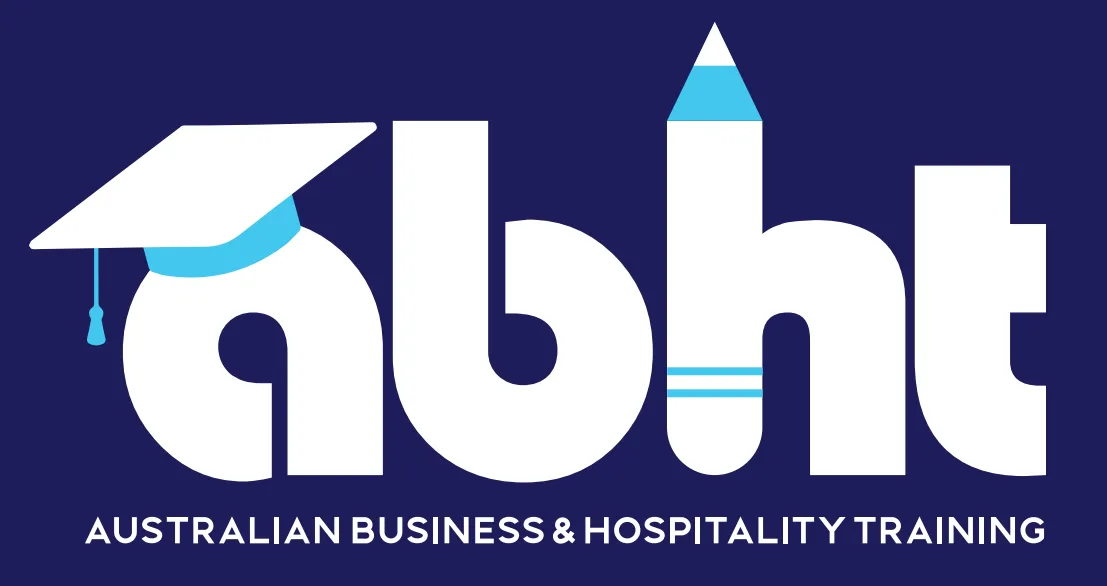
Acknowledgement of Country

In the spirit of reconciliation ABHT acknowledges the Traditional Custodians of Country throughout Australia and their connections to land, sea and community.
We pay our respect to their Elders past and present and extend that respect to all Aboriginal and Torres Strait Islander peoples today.
© Copyright 2026. Australian Business & Hospitality Training. All rights reserved. RTO#31983
